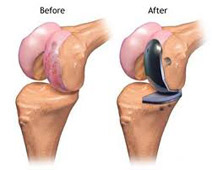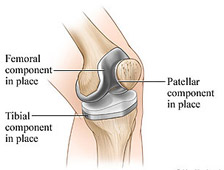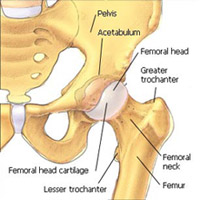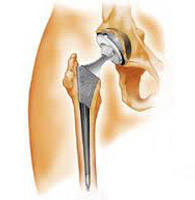| |
|
| |
| |
|
|
Dr.Anoop Khandelwal
M.B.B.S., M.S.Ortho., F.A.G.E., MIOA.
Depuy (J&J) Fellow, Joint Replacement
Arthroplasty Fellowship KBSMC-Seoul, Korea
Advanced Arthroplasty Fellowship LMU - Munich, Germany
Dr.Stuti Mahajan Khandelwal
M.B.B.S., D.V.D, MIADVL, MCSI.
Fellowship in Cosmetic Dermatology,
Summer Academy Trained (Munich, Germany)
|
|
|
|
|
|
| |
| |
|
 |
| |
| Knee Replacement |
| |
|
| |
|
 |
Who needs Knee Replacement Surgery? |
| |
A person having a stiff, painful knee that prevents them from performing even the simplest of activities and other treatments are no longer working. |
| |
|
 |
What happens during Knee Replacement Surgery? |
| |
Once you are under anesthesia the procedure itself takes apporximately 1 to 2 hours. Your orthopaedic surgeon will remove the damaged cartilage and bone, and then position the new metal and plastic implats to restore the alignment and fuction of your knee. |
  |
 |
What are recent advances in Knee Replacement Surgery? |
| |
Minimally invasive surgery (MIS) has revolutionized knee replacement surgery. Its key characteristic is that, It uses specialized techniques and instrumentation to enable the surgeion to perform major surgery without a large incision.
Mis knee joint replacement requires a much smaller incision, 3 to 5 inches, versus the standard approach and incision, which is typically 8 to 12 inches. It may lead to less pain, decreased recovery time and better motion due to less scar tissue formation. |
| |
|
 |
What happens after Knee Replacement Surgery? |
| |
The average hospital stay after knee joint replacement is usually 3 to 5 days. The vast majority of people have dramatic improvement. This improvement is most notable one month or more after surgery. The pain caused by the damaged joint is relieved.
people are stading and moving the joint, the day after surgery. Once muscle strength is restored with physical therapy, people who have had knee joint replacement surgery can enjoy most activities (except running and jumping). |
| |
|
 |
Is knee Replacement Surgery safe? |
| |
Knee joint replacement have been performed for years and surgical techniques are being improved all the time. As with all surgeries, however, there are risks (less than 2%). Since you will not be able to move around much at first, blood clots are a particular concern. Infection and bleeding also are possible, as are the risks associated with using general anaesthesia. |
| |
|
 |
How long will new Knee joint last? |
| |
We now known that about 85% of the joint implants will last 20 years. Improvement in surgical technique and artificial joint materials should make these artificial joints last even longer. |
| |
|
 |
How can I prepare my family and myself before surgery? |
| |
Several weeks before you undergo surgery, discuss your recovery with your surgeon and care giver. Speak with your family members and/or friends about the role they will play in your recovery. |
| |
| Hip Replacement |
| |
| |
 |
Who needs Hip Replacement Surgery? |
|
Doctors recommends joint replacement surgery when hip pain and loss of function become severe and when medicines and other treatments no longer relieve pain. |
| |
|
 |
What happens during Hip Replacement Surgery? |
| |
Total hip replacement surgery replaces the upper end of the thinghbone (femur) with a metal ball and resurfaces the hip socket in the pelvic bone with a metal shell and plastic liner. Doctor may attach replacement joints to the bones with or without cement.
- Cemented joints are attaches to the existing bone with cement, which acts as a glue and attaches the artificial joint to the bone.
- Uncemented joints are attached using a porous coating that is designed to allow the bone to adhere to the artificial joint. Over the time, new bone grows and fills up the openings in the porous coating, attaching the joint to the bone.
|
| |
|
 |
What happens after Hip Replacement Surgery? |
| |
Rehabilitation (rehab) after hip replacement surgery may vary depending on whether the surgeon used cement or cementless methods. It also determines how much weight you can puton your leg. Generally you cannot put any weight on an uncemented hip for about 6 weeks. With a cemented or hybrid hip,you can usually put some weight on your leg right away. But you'll still need a walker, a cane, or crutches for several weeks.
In general, most people get out of bed with help on the day after surgery. Over the next few days, you will learn how to walk with a walker or crutches. Most people go home within afew days to a week after surgery. |
| |
  |
 |
Is Hip Replacement Surgery Safe? |
| |
The complication rate following hip replacement surgery is low. Serious complications, such as joint infection, occur in less than 2% of patients. Major medical complications, such as heart attack or stroke, occur even less frequently. |
| |
|
 |
How long will my new Hip Joint last? |
| |
Most artifical hip joints will last for 10 to 20 years or longer without loosening, depending on such factors as :
- Your lifestyle and how much stress you put on a joint.
- How much you weigh (being very overweight puts extra stress on the joint).
- How well your new joint and bones mend.
|
| |
|
 |
When can I drive again? |
| |
You can usually drive again after about six weeks. |
| |
|
 |
When can I go back to work? |
| |
This depends on your job, but you can usually return to work between 6 and 12 weeks after your operations. |
| |
|
|
|
| |
| To Have a Flawless & Radiant Skin you always dream of..... |
| |
| For A Bride To Be... |
| Your skin reflects the state of your Inner health |
| Routine Skin care and maintenance regime + Good diet, exercise and healthy life style are the absolute essentials for a Flawless skin |
| |
| There's always so much pressure on the bride to look gorgeous on her big day. But stress of that day oftern makes skin dull, however that doesn't have to be with you. |
| |
 |
Bridal Basic In Dermatology |
|
Ideally this treatment for face, body and hair require 2-5 months of time before your wedding.
-
How to maintain Skin?
- Use cleanser according to you skin type, toner and moisturiser to maintain and tydrate your skin properly.
Day time : Sun protection is a must. Use sunscreen of SPF min 30 or more to protect from sun damage.
Night time : Regular use of skin lightening creams at night will help tackle blemishes and even out your skin tone.
Don't ever experiment last moment with new products, take proper sleep, nutritious diet and some fitness exercises.
|
| |
|
 |
Role of Dermatologist |
| |
Apart from treating skin problems, dermatologist recommended cosmetic procedures for rejuvenating your skin.
- Chemical Peels
- Facials are superficial way of cleansing the skin. Chemical peels remove dead skin from deep leading to glowing & healthy skin.
No of Session : 3-6 sittings
Cost : Rs. 500 to 1200 approx.
- Microdermabrasion (Skin Polishing)
- This treatment has deeper effect than peels. It helps get rid of Acne scars, black heads over face and back giving a polished look to your skin.
No of Session : 3-6 sittings
Cost : Rs. 800 to 2000 approx.
- Hair Treatment
-
To make hair soft, dandruff free and prevent hair loss, Low intensity laser and UV comb gives wonderful results.
|
| |
|
| Advanced Treatments |
| |
|
 |
Acne Treatment |
| |
- What is Acne?
-
Acne is a condition which has plugged pores (black heads, white heads), inflamed papules (pimples) & deeper nodules
- Why is Acne treatment essential?
-
Treatment of acne varies according to type of acne. However, proper treatment is essential for preventing post acne pigmentation & post acne scarring
- What are the treatment options available?
-
1. Proper cleansing with a good face wash is very essential element in treatment of acne.
- 2. Topical creams, comedone extraction & MICRODERMABRASION (skin polishing) are different treatment options for mild acne.
- 3. Oral medications, Topical creams, LASER TREATMENT, CHEMICAL PEELS are recommended for moderate to severe acne & post acene pigmentation.
- 4. For severe post acne scarring, various procedures like SUBCISION, DERMAROLLER, LASER SKIN REJUVENATION are done.
|
| |
|
 |
Laser skin rejuvenation |
| |
Sun exposure causess more damage than you think!!! |
| |
Freckles
Fine Lines & Early Ageing
Pigmentation
Sunburn
Melasma
Actinic Keratosis (Pre-canceous Condition)
Tanning, Spots, Uneven Complexion
- Prevention - When should one use sunscreen?
- Generally you are in habit of using sunscreen in summers, while going our or on beaches but it is essential to protect your skin
All day....... All year
Even if you are indoors, ultraviolet rays exposure can occur even throught Car Windows, Computer screens, in cloudy season.
- What are the treatment options available?
- 1. Sunscreen of min SPF 15 or more according to skin type is prescribed.
- 2. LASER PHOTOREJUVENATION (IPL) can be done for sun tans, spots, uneven complexion
- 3. Chemical peels for de-tanning, microdermabrasion for the fine lines, early agening & maintaining the skin.
|
| |
|
 |
Laser Hair Reduction |
| |
It is used for both facial & body hairs. Multiple sittings & maintenance sittings are required to achieve permanent hair reduction. |
|
|
|
|
|
|
| |
| |
| |
| |
| |
|








